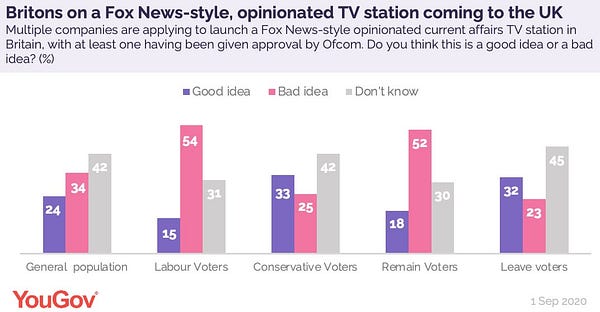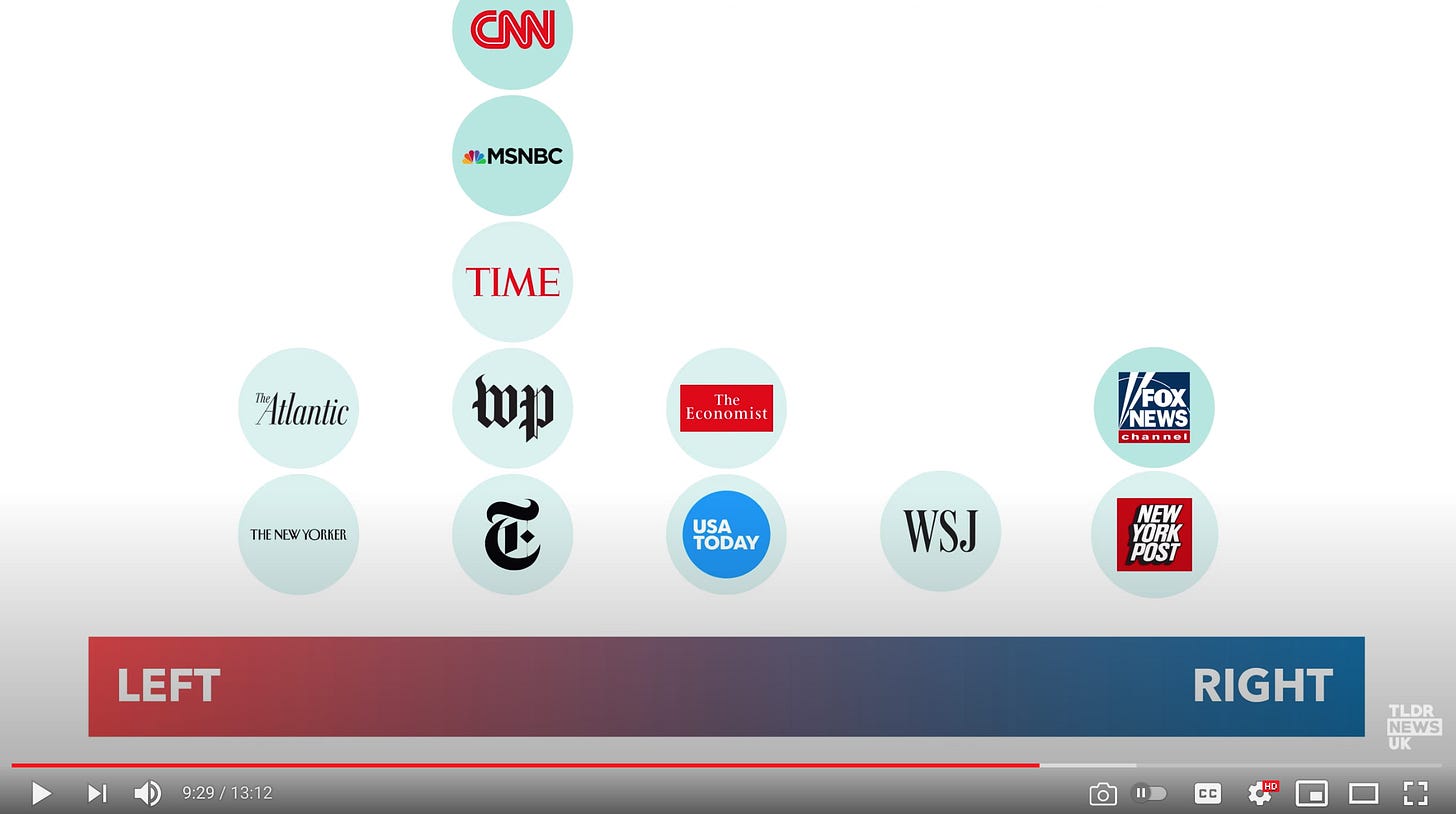GB News UK TV: A New, Golden Dawn For Conservative Media
Murdoch and Neil’s new TV news channels are not the only factor advancing the UK’s conservative media landscape.
In 2021, two new TV news channels are racing to launch in the UK: GB News, headed by former BBC heavyweight Andrew Neil, and Rupert Murdoch’s News UK TV.
While Murdoch’s project has remained enigmatically low-key so far, the GB News team have been forced to make numerous public assurances of impartiality as part of their publicity drive, as fears abound that the UK will be laden with not one, but two “FOX News-style” channels by the end of spring.
GB News is reported to be “a 24-hour current affairs channel” that will fill a supposed ‘gap’ in the UK market for ‘personality-driven’ news content. This is the first key fuel for critics’ fears: ‘talk-show host’ style news segments — commentary rather than straight fact reporting, à la Rachel Maddow of MSNBC or Tucker Carlson of FOX News — are a distinctly American product of different regulatory broadcast standards for impartiality.
In addition to the concern that the dawn of a “newsotainment” era for UK broadcast news could create a Trump-esque shift in our political reality over and above what we have already seen due to unregulated and/or illegal social media practices, news about the future of broadcast regulator Ofcom, and the BBC, have added an extra angle to the anxiety.
Though Trump has left office, ‘Trumpism’ remains pervasive throughout the US. Does the news that the UK might follow in America’s footsteps mean we might be in for our very own ‘Trump era’?
The Results of ‘Foxified’ News
In a January column for The Guardian, Marina Hyde called Trump’s presidency “the logical result of the type of hyper-partisan disinformation first fostered by Fox News”. It’s clear that, despite an ongoing struggle for ratings across the sector, America’s right-wing TV news has done incredibly well of late. In addition, what FOX News has lacked in direct viewership it has made up for in relevancy and agenda-setting because of, rather than despite, its divisiveness.
Neil’s populist appeal to the “vast number of British people who feel under-served and unheard” echoes Trump’s ‘drain the swamp’ rhetoric. There absolutely is a problem: local news, in particular, has suffered due to an ad funding crisis and certain regions have become ‘news deserts’. A remedy to this must emerge this decade but history has proven that it will never be a “platform for demagoguery”.
One need only look at the disinformation tactics employed by the Vote Leave campaign to realise the feasibility, and destructive potential, of this scenario.
The explosion in popularity of right-wing media stateside — not forgetting far-right propaganda sites such as Breitbart and ‘influencers’ such as Joe Rogan who often promote conservative views — can’t have escaped the two channel teams in their claim that regional audiences are ‘underserved’ (presumably of right-wing punditry.)
Though GB News keep repeating their ‘impartiality’ line in public, their communications elsewhere have carried a different inflection.
The Position
GB News began recruiting for more than 100 journalists around the country in early 2021, within a publicity drive that positioned them as a rebellious upstart:
“We are serious about changing things, so only apply if you genuinely want to make a difference and reflect the stories and issues that really matter to the people of the UK.”
Media bias is widely bemoaned by both left and right in the UK and while there is plenty of merit to, say, the argument that power and money are concentrated in London, this is true across numerous industries. Media bias is real, complex, and, particularly when concerning the BBC, tends to be overstated by both sides.
While the above implicit, and other explicit references to ‘refreshed’ accuracy and impartiality are littered throughout their publicity, GB News’ true intentions are being discussed more directly behind the scenes. Journalists they approached told The Telegraph the channel:
“was pitched to them as a right-wing alternative to the BBC.”
Vitriol concerning the state of the UK’s ‘biased’ media landscape from one of the channel’s founders and funders, Andrew Cole, is quoted in The Telegraph piece. It would appear he believes his channel’s right-wing skew is needed:
“The Guardian is a “disgusting extremist rag”, he has written, while Bloomberg is “very suspect” and “almost unreadable”. “Journalism has one problem alone — political bias”
Less has been revealed about the makeup of Murdoch’s News UK TV, with most of the information so far detailed by Jim Waterson in December. But a series producer job briefly advertised revealed News UK TV will begin with a short primetime schedule comprising of “three key programmes” including:
a ’daily factual entertainment show’ that will straddle traditional TV and online content, with an emphasis on comedy.
One wonders whether this is an opportunistic reaction to the new director of the BBC Tim Davie’s statement that the broadcaster’s comedy is “too left-wing”. Assuming GB News will be launching first, perhaps right-wing comedy will have to be Murdoch’s gap in the TV market. There’s no space left in print, that’s for sure.

Murdoch Party Line
Murdoch has a longstanding global print empire on several continents, and though he has always denied dictating an editorial line it has been fairly exclusively right-wing: all but one of Murdoch’s almost 200 papers around the world backed the Iraq War, a fact that then-Daily Mail editor Paul Dacre told the Leveson Inquiry was a critical factor in its expedition.
UK newspapers are held to fluctuating regulatory standards, laxer and more disparate than the broadcasting code. Though Murdoch, via 20th Century Fox, owned a minority stake in Sky News’ parent company BSkyB for its first two decades, he was prevented (at the 11th hour) from buying it outright.
Thanks to the Ofcom code, he was also prevented from pushing his partisan preferences at the channel. Stephen Cushion, Professor at Cardiff School of Journalism found that:
“the channel did not become “Foxified” — as he had reportedly wanted — but maintained a reputation for impartial journalism. In a systematic study of the BBC News Channel and Sky News in the early 2000s, I found neither channel adopted the kind of partisan coverage evident in US cable channels.”
More recently, Cushion says, “the growth of online news and social media has made journalism far more opinionated” regardless, and that this has influenced “a rise in interpretive journalism in television news.”
It’s reported that Murdoch is considering an online platform at least in part for News UK TV, which could mean evading Ofcom, although his license to broadcast has already been approved by the regulator so how this will balance out is unclear.
Regulators That Deregulate
Given that he was never able to ‘Foxify’ Sky News, and FOX’s brief appearance on UK airwaves was, thanks to Ofcom, short-lived, Murdoch may be looking for an ‘online loophole’ of sorts.
The protection for broadcast news impartiality can be found in Section 5 of the Ofcom Broadcasting Code. Rule 5.1 states simply:
“News, in whatever form, must be reported with due accuracy and presented with due impartiality.”
Regarding ‘personality-driven’ programmes, rule 5.9 states that presenters:
“may express their own views on matters of political or industrial controversy or matters relating to current public policy. However, alternative viewpoints must be adequately represented”
“Adequately represented” does not necessarily mean equal airtime. Radio broadcasters LBC have a mixture of left- and right-leaning presenters, with more at the right end of the spectrum. Recent research by academics showed that the BBC gives slightly more airtime to conservative views. That’s before we consider the country’s largely right-leaning print press, courtesy of Mr. Murdoch.
So under the current guidelines, a certain amount of skew exists in broadcast. But what if Ofcom were to relax them?
Reports say Boris Johnson’s appointment of Daily Mail Group editor-in-chief Paul Dacre as Ofcom’s new chair is imminent. Last summer, at the news that Dacre, the “longtime bete noire of liberals”, was being considered Labour peer Lord Adonis warned that Dacre “demonstrably doesn’t believe in impartially and statutorily regulated media”. He is a longtime critic of the state-funded BBC, and fears for its safety have been at the forefront of the conversation around his appointment.
Johnson, who has previously argued for wildly unpopular right-wing policy changes such as privatisation of the NHS, has stated that he also desires to upend the historic funding model of the BBC.
Dacre could spell a significant shift in the strength of the regulator whether explicit, by changing the code, or implicit, by changing the culture within the institution. There is precedent for this; see 2008's financial crash. The regulators did not regulate; their argument being that the banks would not use their service if they did.
Andrew Neil appears to think that Ofcom is “quite liberal” anyway, citing the existence of Channel 4 News which, he says, “clearly has a particular ideological position”.
Does the audience for these channels exist?
Whether or not the channels become the ‘platform for demagoguery’ suggested depends heavily on what becomes of Ofcom. But their success with advertisers, and therefore their financial security, will depend on how audiences respond.
Brexit, and the US example, may hint that the audience is there, or can be drawn in. Pollsters say that appetite is not strong across the nation as a whole, though:


But…pollsters have been wrong.
Yet one of the reasons FOX News has been able to thrive in the US is because — before Newsmax and One America News caught on — it almost exclusively occupied its corner of the market. A majority of the most successful news outlets in the US, in print and broadcast, are liberal, as shown in this chart from TLDR News:
The picture is not quite the same for the UK. Existing right-wing audiences have plenty of supply, whether from the UK’s most-read newspaper, The Sun, The Mail Online — for a while the most read newspaper website in the world — and its prequel The Daily Mail, The Telegraph, The Times, The Express…
Any new right-leaning UK channel will have to compete with them. FOX News’ success is arguably down to the fact that it simply hasn’t had that competition.
Clearly, there is a distinct bit of alchemy to this process. It’s likely we will see two reasonably Fox-y channels in operation by the summer. But there are enough moving parts — the fate of Ofcom; the competitiveness between the two and within an already right-wing UK press; the TV vs online balance of Murdoch’s channel— that nothing, at this stage, is guaranteed.
It may seem that we’ve already had our Trump moment with Boris fumbling his way to 100,000+ deaths. But it could be worse. There’s always Rees-Mogg.






